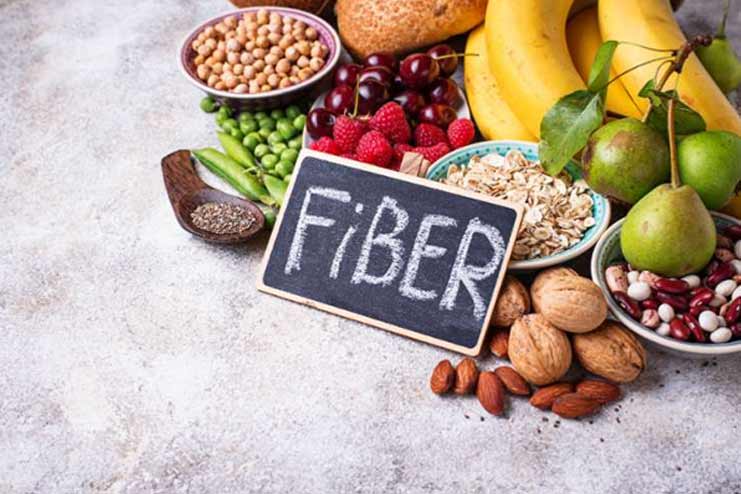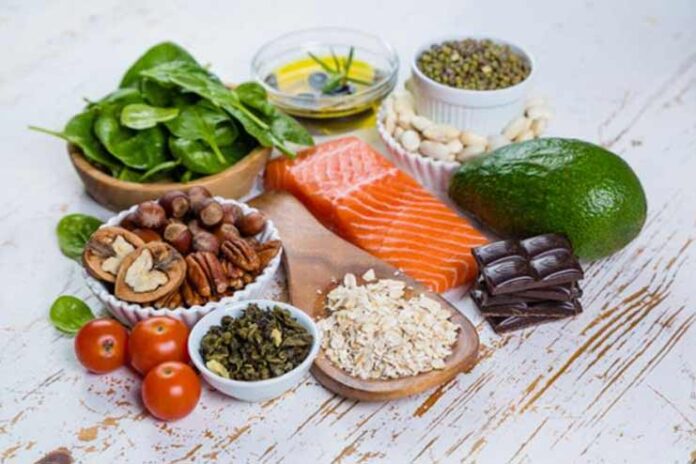Affiliate Disclaimer
Some links in this article are affiliate links. We may earn a small commission if you make a purchase through these links, at no extra cost to you. We only recommend products we find useful to our readersInsulin resistance is a rising global health concern. It is a condition in which the body’s cells cannot react to insulin as intended. It affects millions of people globally and is linked to diseases such as Type 2 diabetes, obesity, and metabolic syndrome. Your diet can significantly impact preventing diabetes.
Furthermore, altering your diet may improve your ability to manage the illness if you already have it. The management of insulin resistance is becoming increasingly dependent on nutrition. A carefully thought-out insulin-resistant diet plan can achieve blood sugar regulation and improve insulin sensitivity. People can prevent or control this illness by avoiding high-glycemic diets and consuming certain nutrients.
Top Foods to Eat if You’re Insulin Resistance
Here is what you should strive for while you are preparing meals and snacks:
1. Carbohydrates

When discussing carbohydrates that cause insulin resistance, knowing that not all carbohydrates are bad is essential. In contrast to the glycemic load (GL), which considers the portion’s size, the glycemic index (GI) classifies foods according to the effect they have on blood sugar levels. The consumption of low-glycemic foods, which include legumes, fruits, vegetables, whole grains, beans, and low-fat dairy products, as opposed to processed foods, which include white bread and pasta, assists in maintaining stable blood sugar levels and enhances insulin sensitivity.
Carb cycling, which alternates between days with high carbohydrate intake (such as training days) and days with reduced carbohydrate intake (rest days), can improve insulin response and energy levels. This planned strategy allows your body to make effective use of carbohydrates without causing a spike in blood sugar.
Also, read: What Are Carbs? Important Benefits, Types and Deficiency
2. Fiber

The benefits of fiber extend beyond digestion. Soluble fiber significantly influences insulin sensitivity by reducing the rate of digestion and controlling the amount of glucose that is absorbed. Consuming more than fifty grams of fiber daily can assist you in maintaining a good healthy balance of blood sugar. Several foods are high in fiber, including almonds, black beans, broccoli, lentils, and oats.
Additionally, unusual high-fiber superfoods such as konjac root and seaweed can improve insulin sensitivity. Konjac root’s high glucomannan content causes the stomach to expand, creating a sensation of fullness while also helping to maintain normal blood sugar levels. The unique polysaccharides found in seaweed have the potential to improve gut health and insulin responsiveness with favorable effects.
Also, read: Tips to Reduce Too Much Fiber in Your Diet
3. Omega-3 Fatty Acids

Getting omega-3 fatty acids in fatty fish and certain nuts and seeds is possible. These fatty acids help enhance how your body uses insulin, which helps control blood sugar levels and minimize insulin resistance. According to an investigation, one factor that contributes to the development of insulin resistance is persistent, low-grade inflammation, which is related to obesity.
Consuming foods very rich in omega-3 fatty acids can help reduce inflammation because they have anti-inflammatory qualities. In addition, omega-3 fatty acids may enhance how cells react to insulin, encouraging cells to take up glucose from the bloodstream and regulating blood sugar levels. Consuming foods abundant in omega-3 fatty acids might be an advantageous addition to your diet for managing insulin resistance.
Also, read: 5 Best Omega-3 Supplements for Men
4. Vitamin D

Vitamin D, also known as “sunshine vitamin,” plays an essential role in regulating the insulin secretion and sensitivity. Research has demonstrated that those with low amounts of vitamin D are prone to develop insulin resistance. Because of its anti-inflammatory qualities, vitamin D has the potential to alleviate chronic inflammation, which is a factor that contributes to insulin resistance. Consuming adequate vitamin D from different foods can improve your body’s response to insulin and regulate blood sugar levels.
Also, read: 8 Productive Ways To Increase Vitamin D Absorption
5. Protein

Protein plays an important role not only in maintaining muscle tissue but also in improving insulin sensitivity. By increasing the amount of protein consumed to treat insulin resistance, it is possible to effectively reduce postprandial glucose spikes and stabilize blood sugar levels after meals. The consumption of lean protein, such as chicken, fish, and eggs, plays a vital part in this process since they contribute to a feeling of fullness and decrease the absorption of carbohydrates.
For individuals adopting a plant-based approach, incorporating plant-based proteins such as hemp protein, lentils, and spirulina can help manage blood sugar and protein levels. The protein derived from hemp is abundant in beneficial fats and fiber, which helps with digestion and maintains blood sugar levels. On the other hand, lentils offer protein and complex carbs, which allow for the progressive release of glucose.
Also, read:
- 12 Roles Of Proteins In The Body – Know The Importance!
- 7 Delicious Protein Shakes Available on Amazon
6. Magnesium

Magnesium is an essential component and is involved in several metabolic activities, including the regulation of glucose levels and the transmission of insulin signals. Magnesium is responsible for activating insulin receptors in the body, stimulating insulin secretion from the pancreas, and facilitating the transfer of sugar into cells located throughout the body. If your magnesium levels are low, the cells in your body will become less receptive to insulin, which can result in more prevalent insulin resistance. Incorporating enough magnesium into your diet may enhance insulin sensitivity and also maintain healthy blood sugar levels.
Also, read: 22 Helpful Magnesium Benefits For Health That Will Blow Your Mind
How Balanced Nutrition Impacts Insulin and Other Hormones
Numerous daily processes that sustain your health depend on hormones. While a variety of factors, such as our diets, might upset our hormonal balance, plenty of items can promote good hormone regulation. Dietary habits, specific nutrients, and general nutrition can all positively or negatively affect hormone balance. Numerous dietary habits, such as eating foods with a higher glycemic load, consuming additional calories, and fasting, all have an impact on hormone levels found in the bloodstream.
Restoring hormonal equilibrium is crucial to controlling insulin resistance. Insulin does not function in a vacuum; it interacts with other hormones that affect hunger, metabolism, and stress responses, such as cortisol, leptin, and ghrelin. For example, persistent stress-induced elevation of cortisol might result in insulin resistance, whereas leptin regulates hunger and energy balance. Insulin resistance and other metabolic problems may worsen due to an imbalance in these hormones.
In this interaction, nutrition for hormonal balance is crucial. A diet high in whole foods, fiber, lean proteins, and healthy fats can stabilize these hormones. Certain nutrients, like antioxidants and omega-3 fatty acids, reduce inflammation and support normal hormone levels. By addressing their diet and stress levels, people can promote hormonal balance, improve overall metabolic health, and effectively manage insulin resistance.
How to Combine Nutrition with Movement and Rest for Insulin Management
Combining exercise with healthy eating habits is essential to improving insulin sensitivity. Regular exercise, particularly weight training and yoga, can enhance glucose uptake and help maintain stable blood sugar levels. Exercise and insulin resistance are strongly linked. Strength training helps build the muscle, which in turn raises insulin sensitivity. On the other hand, yoga helps relieve stress and lowers cortisol levels, which can harm insulin levels.
Blood sugar levels and sleep quality are equally essential. Getting quality sleep to maintain hormonal balance is crucial, affecting insulin and glucose metabolism. A restful night’s sleep can be achieved by including sleep nutrition, which consists of the consumption of foods such as cherries, almonds, and herbal teas. Sleep nutrition can also help stabilize insulin levels. These foods contain a high concentration of melatonin and magnesium, two nutrients that improve sleep quality and general recovery.
Conclusion
Nutrition is one of the most effective tools for managing insulin resistance. People with insulin resistance can better control their blood sugar levels, lower their risk of problems, and enhance their general health by eating mindfully and in moderation. A diet low in harmful fats, sweets, and processed food and high in fruits, vegetables, whole grains, seafood, and lean chicken is an insulin-resistant diet. Make gradual adjustments, like consuming fewer sugar-filled beverages, and adjust your diet to suit your tastes and way of life.
References
- https://www.ncbi.nlm.nih.gov/pmc/articles/PMC9505491
- https://www.webmd.com/diabetes/diabetes-insulin-resistance-diet
- https://zoe.com/learn/insulin-resistance-diet
- https://www.health.com/insulin-resistance-diet-8407040
- https://www.healthline.com/health/diabetes/insulin-resistance-diet
- https://www.medicalnewstoday.com/articles/316569#foods-to-eat
- https://www.rupahealth.com/post/the-3-key-principles-of-insulin-resistance-diet
- https://www.ifm.org/news-insights/nutrition-impacts-hormone-signaling
- https://hormoneuniversity.com/food-nutrition/secrets-balanced-hormones-nutrition
- https://jacquibryan.com/eating-for-hormonal-harmony-how-nutrition-impacts-your-body
- https://www.healthline.com/nutrition/14-ways-to-lower-insulin#supplement-with-acv
- https://www.ncbi.nlm.nih.gov/pmc/articles/PMC8707655
- https://dtc.ucsf.edu/types-of-diabetes/type1/understanding-type-1-diabetes/how-the-body-processes-sugar/blood-sugar-other-hormones
- https://agelessandwellness.com/eating-for-better-hormone-health-what-is-insulin-resistance
- https://time.com/7000236/can-food-change-your-hormones
- https://www.yourhormones.info/hormones/insulin
- https://www.veri.co/learn/best-exercises-for-insulin-resistance
- https://www.sciencedirect.com/science/article/pii/S2667036423000018
- https://www.mayoclinic.org/diseases-conditions/diabetes/in-depth/diabetes-management/art-20047963
In this Article

















